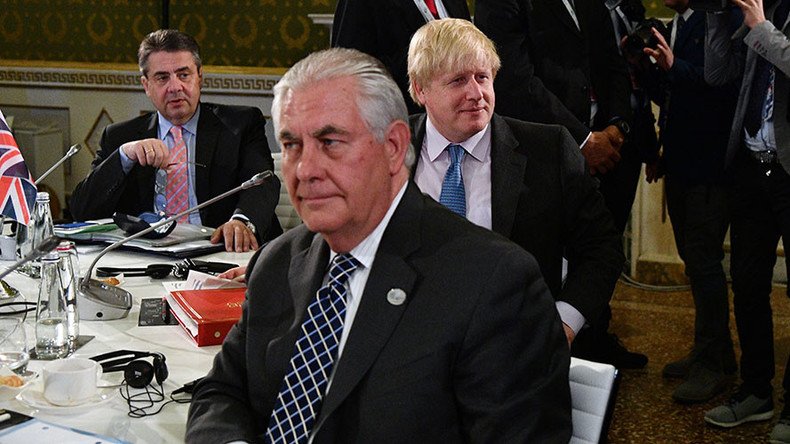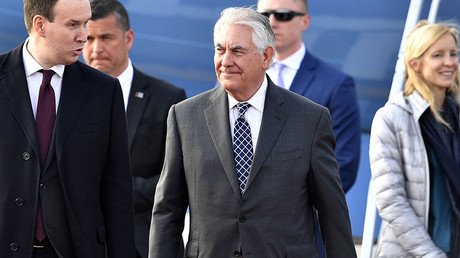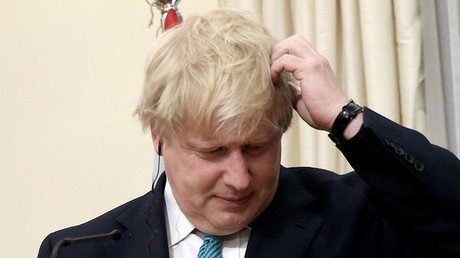New anti-Russia sanctions rejected: ‘US & UK cannot dictate to other G7 members’

Most Europeans are keen to go back to the pre-sanction regime with Russia because sanctions have not worked, says British historian Martin McCauley. The US and the UK cannot dictate to the other members of G7, it is important, he adds.
As top US diplomat Rex Tillerson arrives in Moscow, following the failure of the G7 members to agree on new anti-Russian sanctions at their meeting in Italy, RT spoke to British historian and author Martin McCauley and discussed what we could expect from the Secretary of State’s first visit to Russia.
RT: Tillerson is reportedly calling on Russia to abandon its support of the Syrian government and side with the US and its allies. Is this an ultimatum being set or by Washington?
Martin McCauley: If it is, it is going to fail because Rex Tillerson is the top diplomat in the US and when he meets Sergey Lavrov and presumably also Vladimir Putin, he will need to act as a diplomat and not read out to the Russians and say “this what you must do.” That will fail. There is no use saying Russia should disengage from Syria, stop supporting the Syrian regime because that is what we, the Americans, want. That will fail. He has got to find some common language, some common ground, talking to Lavrov and Putin and put forward some proposals. Ask what they want, what they think, how would they go forward in this relationship because it is one that has considerable tension at present because of the bombing and the chemical warfare which was engaged in. That is very important. The American ambassador to the UN Nikki Haley talking about further strikes – that type of language is rather inflammatory. And what Tillerson has to do is come to calm the waters and say “what do you want, and I would propose what I want and let’s try and find common ground.”
RT: Why is the UK and the US pushing for new sanctions against Russia and meantime the G7 has agreed to reject this idea? What does it tell about the dynamics and influence in that group?
MM: It tells you that the US and Britain cannot dictate to the other five members of G7 because the problem is that sanctions have not worked. The idea of sanctions goes back to the concept that if you apply economic sanctions, then you can change the behavior, the policy of the opponent. Russia’s policy has not changed because of sanctions. It has gone the other way. They are quite determined to overcome the sanctions. If you look at the agricultural situation, Russian agriculture is developing partly because of the sanctions. Therefore Russia is saying “sanctions will have no effect on us, our policy will be in the interest of Russia.” If you look at Germany, there were 6,000 German companies in Russia before the sanctions. The German companies have lost a lot of money; Italians have lost a lot of money. Most of the Europeans are very keen to go back to the pre-sanction regime. But Britain and the Americans can’t now dictate to them, that is very important.
RT: Why does there appear to be some inconsistency from the US regarding its policies on Syria and Russia?
MM: Russia has a strategic plan for Syria. The US has not yet, if you like, its foreign policy from the ground up. They are making it as they go along and they are finding out there are certain difficulties, therefore circumvent those difficulties. It is a day to day policy; there is no overall strategic vision. What is your policy to end the civil war in Syria? What would a post-civil war Syria look like? Russia has proposed a draft Constitution for Syria after fighting ends. The Americans have to come up with something like that. At present, there is no agreement among the American elite. It looks as if there are three generals headed by General McMaster who is imposing his will and having considerable influence. And he appears to be going along with quite a hard line policy toward Russia and trying to force Russia and Assad to back down and to make concessions. That will not succeed. It has to be done by respecting Russia, by respecting Assad because after all he was elected as president and finding some common ground that is possible. The Americans, tomorrow they may change their mind on some things. So, there is no strategic vision, and until they have one, it will be very difficult to engage with them about the future of Syria.
The statements, views and opinions expressed in this column are solely those of the author and do not necessarily represent those of RT.














